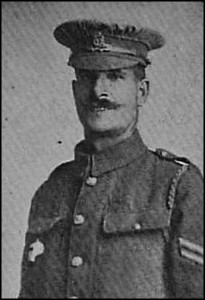Category: Military
Rank: Sergeant
Regiment or Ship: Royal Garrison Artillery
Service Number(s): 126701; 276004
Occupation: Postman
Date of Birth: 1881
Place of Birth: Woodham Ferris, Essex
Address: 93 Windsor Road, Bexhill on Sea
Photos and newspaper articles
Family Information
Mother: Elizabeth A. Bailey (nee Mott), b. 1856 in Woodham Ferris, Essex. The researcher has been unable to establish the father’s name except to ascertain that he was still alive in the 1881 census. At that time Elizabeth and William were living with her mother and brother – Martha and George Mott – in Blue House, Ferris Lane, Woodham Ferris.
Spouse: William married Mabel Waters (b. 1885 in Crowhurst) on 26th August 1905 in a Parish Church in Bexhill. William and Mabel had at least three children – Alfred, Ruby, and Chloe.
In the 1911 census William and Mabel were living at 49 Sidley Street, Sidley, but by 1915 had moved to 93 Windsor Road, Bexhill.
First World War Experience
William enlisted on 29th August 1914 and an article – complete with photograph – appeared in a local newspaper stating:- Bexhill Post Office has contributed 14 to the total of 29,971 employees with the Forces.
When he enlisted William was 5’ 9” tall, weighed 148lbs and had a chest measurement of 38½”. He had brown eyes, dark brown hair, and had a small scar somewhere on his back. He stated that he was 33 years and 7 months old, was a Postman, married, and a Baptist or Congregationalist.
Sometime in 1915 William was wounded and the following article appeared in a local newspaper:-
Saved By A Watch
Bexhill Sergeant’s Escape
Writing from the Military Hospital, Gibraltar, Sergeant W. Bailey, 10th Heavy Battery, R.G.A., of 93, Windsor-road, Bexhill, who was wounded at the Dardanelles some time ago, says:-
“I am glad to say I am still making good progress, and getting stronger every day. I have been allowed up a few hours a day for about a week now, and I am getting on fine. I was very shaky on my pins the first day or two. I was like a ship without a rudder. I was trying to go one way and found myself going another. I can walk about all right now, but I have to take it steady, as I am still a bit sore round the tummy, but that will soon be a thing of the past now, as my wounds are pretty nearly healed up. The Doctor and the Sisters say it is a marvel how quickly I am recovering. With any ordinary decent luck now I ought to be home with you for Christmas, and I live in hope it will be so. There were forty left this Hospital today for home, but they were chiefly Australians, so it will not be home to them. I expect to be one that comes home by the next boat, all going well, but, of course, when I do get in England it will be some little time before I can get home, for I shall have to go in hospital there, and then probably get sent to a convalescent home for a time. I do not know when the next boat will leave here; it might be a week, a fortnight, or even three weeks before there is another one.
I have had quite enough of bed lately (more than a month on my back) to last me for a bit. I do not think I told you that it was my watch that really saved my life; the bullet went through the watch, and that turned it down into the abdomen, otherwise it would have gone clean through my heart. It was serious enough as it was, but had it not been for the old watch it would have been fatal. The strange part of it is the bullet went through the bottom edge of the case and did not touch the works at all. It had only just shaken it off the balance besides smashing the glass.”
William was demobilized on 31st March 1920 by which time he and his family had moved to Halcyon Road, New Abbott, Devon, and he was awarded a pension of 21s 1d per week.
He received the British War Medal, the Victory Medal, and the 1914/1916 Star.


